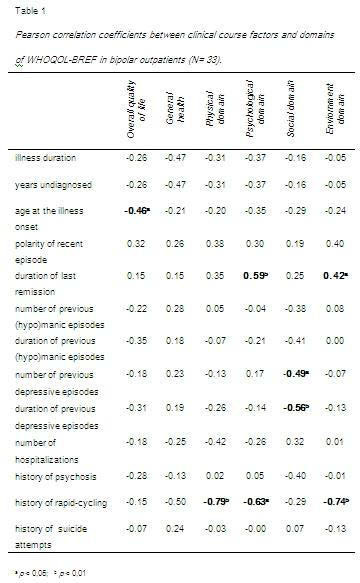No CrossRef data available.
Published online by Cambridge University Press: 16 April 2020
Quality of life (QoL) is reported to be markedly impaired even in interepisode bipolar disorder. Recent depressive episode correlates with poorer QoL than recent manic episode in remitted patients.
We compared QoL between bipolar patients with regard to the polarity of most recent episodes and control group in order to assess relationships between clinical factors and quality of life in bipolar outpatients.
33 remitted bipolar outpatients (19 depressive and 14 manic according to the polarity of recent episode), and 22 healthy individuals completed the World Health Organization Quality of Life Instrument-Short Version (WHOQOL-BREF).
Outpatients with recent depressive episode reported the lowest overall QoL and health satisfaction and had the lowest scores on psychological domain among all groups. Polarity of most recent episode didn’t correlate significantly with QoL. In outpatient group as a whole, several clinical factors including previous depressive episodes were significantly correlated with WHOQOL-BREF scores.

QoL is impaired in remitted bipolar outpatients. Despite the insignificant association between polarity of most recent episode and QoL, our data confirm that depressive symptoms are among the most significant contributors to reduced QoL in bipolar disorder. The importance of gaining full remission is associated with improved QoL.
Comments
No Comments have been published for this article.